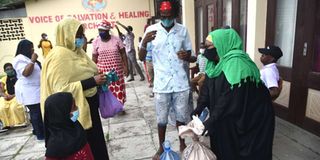Breaking News: At least 10 feared to have drowned in Makueni river
Protect people living with disability from pandemic

What you need to know:
- Many PWDs have secondary conditions that make them more vulnerable to the virus than the rest.
- The government need to ensure that PWDs are accorded equitable and adequate access to healthcare services.
- The surge in Covid-19 cases is projected to strain the country’s health systems to breaking point.
Persons with disabilities’ (PWDs) rights to life and access to health and essential services should be protected at all times. But the measures against the Covid-19 pandemic discriminate against PWDs as they do not provide for disability-specific intensive lifelong healthcare support.
PWDs encounter a series of obstacles unique to their needs, heightening their risk of catching the virus. This is compounded by the disruption of services, barriers in accessing healthcare and a higher risk of violence and discrimination.
The Office of the United Nations High Commissioner for Human Rights (OHCHR) has urged states to prevent discrimination based on disability and remove the barriers.
Kenya has issued a raft of measures to combat the spread of Covid-19. However, their implementation has been chaotic and abusive as the government insisted on indiscriminate coercion rather than persuasion to get the public to comply.
Basic needs
Its response strategy also failed to take into account the basic needs of the most vulnerable in the society. The measures were also not targeted or based on any scientific data as regards the scale of the spread of the virus.
Most importantly, the State failed to inject a meaningful disability perspective into its response strategy.
The only mention of PWDs is in its national advisory to workplaces, where employers are urged to put in place specific unidentified measures in the workplace for promoting their safety and health.
Secondary conditions
Data such as Covid-19 testing, infection, mortality or outcomes by disability status is absent. Even the daily Health ministry updates do not contain such data on Covid-19 testing, infection, mortality or outcomes.
Stay-at-home, isolation, curfew, quarantine and social distancing limit the spread of the virus but can endanger PWDs, especially those with severe disabilities and in need of life-saving care.
Many PWDs have secondary conditions that make them more vulnerable to the virus than the rest.
The government need to ensure that PWDs are accorded equitable and adequate access to healthcare services, including Covid-19 testing kits and personal protective equipment (PPE) and other protective measures to fight against transmission.
The surge in Covid-19 cases is projected to strain the country’s health systems to breaking point.
The government must establish community outreach programmes through disabled people’s organisations and provide community-based support services like running water and health care to PWDs.
We are only as strong as the most vulnerable among us. Identify the impact of Covid-19 on PWDs and put in place effective and specific plans accompanied by other necessary measures for making healthcare services accessible to them as required by the Constitution and UN conventions.
Mr Juma is an advocate of the High Court and disability rights advocate. [email protected].




